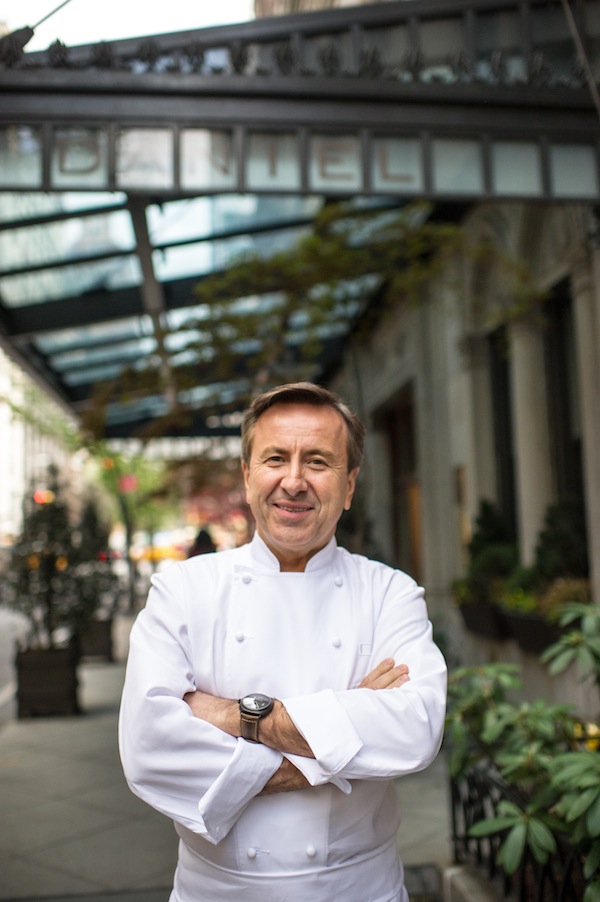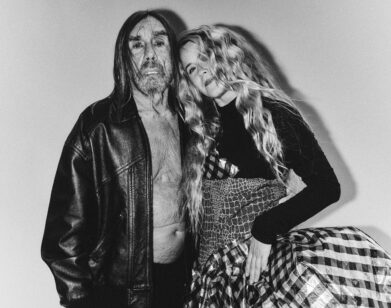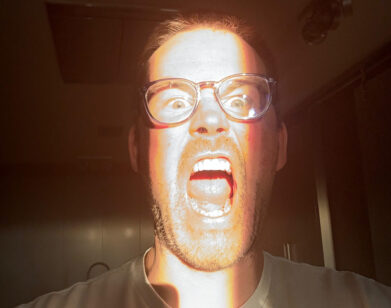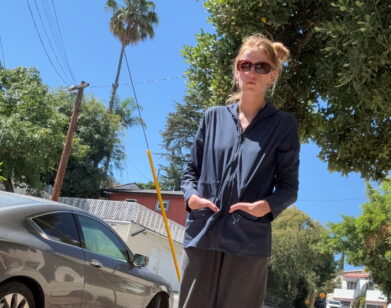The Daniel Boulud Experience
In New York City, where most restaurants close within months of opening, Restaurant Daniel has stayed a paragon of fine dining for 20 years. That’s quantifiable: it has a four-star rating from the New York Times, and has three Michelin stars—an accolade shared with six other New York restaurants. Talking with Daniel Boulud, the founder and chef, it seems he was never planning to settle for less.
Dining at Daniel is about an experience, orchestrated meticulously by waiters, sommeliers, chefs and the self-described perfectionist Boulud. Mr. Boulud does not want to impart grandiosity; instead he brings about a relatable elegance. With a classical Corinthian arcade and coffered ceiling, the dining room is open and understated. Staff pace its perimeters, calm but dizzyingly attentive. Backstage, cooks are working just as diligently: Some famous culinary names have started where they are—Michael Anthony, the executive chef and partner at Gramercy Tavern; Johnny Iuzzini of Jean-Georges and host of Top Chef: Just Desserts; and Matteo Bergamini, the executive chef of SD26, are just a few Daniel alumni.
Charismatic and talkative, Boulud, the man, is part of the experience too, table hopping and inviting guests—soon to be fans—back to the kitchen. Raised on a farm in Lyon, France, Boulud came to Washington D.C. in the early ’80s. In 1982, he moved to New York, where he made a name for himself as the executive chef at Le Cirque. Daniel opened on East 76th Street in 1993 and was immediately recognized as one of the best around. Since then, he’s built an empire of over a dozen restaurants in the United States and abroad, in New York alone having opened Café Boulud, DB Bistro Moderne, Bar Boulud, DBGB Kitchen & Bar, and most recently Boulud Sud—but Daniel, which has since moved to East 65th Street, remains nearest to his heart. “I live right nearby,” he says. “And I have my office here at Daniel, while all the other executives have their office in midtown. It’s my life here at Daniel.”
When we speak, Boulud, the New York fixture he is, launches straightaway into an Andy Warhol story.
DANIEL BOULUD: At Le Cirque in the 1980s, Andy would come in very often. We had our picture taken for Interview in 1987. We had this photographer who was kind of crazy. At night, after we were exhausted from service, he put all the cooks around the table and he put me somewhere in the corner of the room. He had the little tripod with a broken mirror and he was shooting me in the mirror—a pre-Photoshop technique. The mirror was positioned to reflect me in the center of the table and I was kind of screaming, like I was passing through the table as a ghost. And all the cooks were screaming around the table. It was a very fun picture. It was almost 30 years ago. Daniel Boulud at Le Cirque.
RACHEL SMALL: Oh, wow.
BOULUD: Before that, I was at Plaza Athénée, where a jacket and tie was required. Andy Warhol came with his turtleneck, because he was always wearing a turtleneck, with a tie over it, and we gave him a jacket—so he had a jacket and tie over the turtleneck. It was pretty cool.
SMALL: That sounds very Andy.
BOULUD: Very much.
SMALL: Can you tell me how came to New York from France?
BOULUD: When I came to America, I spent two years in Washington, D.C. I wasn’t working too hard—for me it was a sabbatical. I had time to travel. I did all of California from north to south. I did Florida from north to south. I went to the Midwest. I spent time discovering the culture because I thought I was going to stay in America for only two years. Then I decided to come to New York. I first worked at The Polo Lounge in the Westbury Hotel, then Plaza Athénée. I’ve been in the same ZIP code for 30 years! Then I wanted to work in a restaurant. Le Cirque was looking for a chef and they approached me. I was excited to be able to be part of this restaurant with an amazing reputation, but not a good one for food at the time. I made it clear that if I was coming to Le Cirque it was going to change.
SMALL: What ideas about cooking did you bring with you to Le Cirque?
BOULUD: Le Cirque at first was one of those general French restaurants in town, which were cooking more or less the same food. At Le Cirque I wanted to do something different, while respecting the foundation of the restaurant. I did that through the menu. We worked with the classic dishes Le Cirque had, for example, Bollito Misto, or pot-au-feu. Bill Blass came in all the time, and I would make him roast chicken with spring potatoes and spring porcini with spring onion. And baby artichokes. I would make this chicken with so much pride and so much care and it was the best chicken on the planet. And never, ever did he find a better chicken. Norman Parkinson, one of the greatest photographers alive, came every lunch to Le Cirque. And he never opened the menu, ever, with me. He always let me cook for him. And every time he would clean up his plate with his bread and then he would take his marker and write on the plate how much he loved the food. And I had stacks of plates like that where I was just wiping the plate and keeping the marker on it. He was such an eccentric and exciting man. For me, I was taking pride in making the customer happy with sometimes very humble and delicious. I think at Le Cirque I learned how to make real food, which is what people crave, not just gimmicky things on a plate.
SMALL: How did you start Daniel?
BOULUD: After six years at Le Cirque, I decided to start my own business. I opened Daniel at 76th Street in May ’93.
SMALL: And here you are.
BOULUD: It’s been amazing ride, and fun ride, and very exciting.
SMALL: What sort of “French-ness” do you bring to Daniel?
BOULUD: For sure, the setting of the dining room—the refinement in the experience of dining at Daniel. But what I bring—my team and I, because it’s not only me—is this sense of elegance and casualness, and no pretension. There’s also a sense of loyalty—loyalty to my customers, but also loyalty from my staff. Also, I think a sense of perfection; I’m a bit of an obsessed freak with perfection. I think I bring craziness sometimes, because if there is someone who’s going to dare do something crazy, it’s me. I have a sense of respect: respect for my suppliers, respect for the staff, respect for the customer—as long as they respect us. When we have a customer who is playing a provocative, disrespectful game, then we just prefer to just throw him out, rather than deal with it. Because we work too hard to make too many people happy. And some people, sometimes, are unhappy themselves. And that can really create a frustrating performance to us and to the staff and all that. But I’m doing much better. I don’t throw customers out as much as I used to. In the old days, “You don’t like it? Get out!” I’m much nicer now.
SMALL: And obviously you have this amazing, loyal staff.
BOULUD: I’ve had so many chefs pass through, and amazing talent, and I know many who are still with me. I hope the new generation will have as much fun and success as I have had.
SMALL: As a mentor, what do you try to teach your chefs?
BOULUD: A beginner cook is going to have to be patient to really learn well. When you start to beat your master, that’s when you’re really starting to master the thing. But it’s going to take a while. After that, you have to define what you want to be, who you want to be, where you want to me.
SMALL: How do you see Daniel, the restaurant, within the culinary landscape of New York?
BOULUD: I think it fits exactly where it’s been for the last 20 years. We are in the top five restaurants in New York. Daniel is about luxury. It’s a luxury where when somebody has never come they maybe expect to be intimidated, but once they have the experience I think they feel this is a welcoming, fun and great experience to have. The menu, the price point, the level of service, and class we offer to people… I think it’s incredible. Not every restaurant can be like that—it’s a commitment, in terms of dedication to excellence.
SMALL: As Daniel has become more and more well known, I feel like you’ve become more of a public figure, as well.
BOULUD: Which is not always the best part of it. But I think I’ve managed to keep my privacy.
SMALL: What is your favorite thing that you cook, just for your own pleasure?
BOULUD: For me, a braise. It’s nurturing, it’s soothing, it smells good in the house.
SMALL: Do you have a favorite thing that someone else cooks for you?
BOULUD: My favorite thing is when I go back and my mother cooks for me. Because it just throws me back the same flavor. And I try to modify things: I say, “Why don’t you do this and that?” My mother is older, but she cooks a lot, and she doesn’t want to change anything. She’s a very good cook, and my grandmother was an amazing cook.
SMALL: Did you first learn to cook from your mother?
BOULUD: I learned from my grandmother, because we were cooking a lot for the farm. Breakfast, lunch, dinner.
SMALL: In your 20 years at Daniel, what has been your most memorable night?
BOULUD: Of course, when you have a big review. To read about our first 4-star review by Ruth Reichl, we had to go to the New York Times and wait for the paper to come out. And so, by 8:30, 9 o’clock, we were in the front of the New York Times building to see if the review was going to come out, and what it’s going to be. It’s those moments when you get the most pride and joy and excitement. Also receiving the president of the United States in your restaurant is a big thing. Obama came three times. There’s a sense of pride when you’re one of few who has had a chance to spend an evening with the president of the United States. Despite if he’s Republican or Democrat, we accept them all. Also, I remember days when I had Julia Child coming, with close friends. I had a great relationship with Julia. So those moments are more of affection and admiration than of fancy pride.
SMALL: When someone leaves your restaurant, what do you want them to be thinking?
BOULUD: To make another reservation for the next visit. [laughs] Because that means that they had a wonderful time. But loyal customers, or customers who recommend their friends, give me the most pride. I think that is the biggest compliment I can get. I think in the restaurant business, it takes patience from the customer to spark up a relationship with the restaurateur, but it takes also work from the restaurateur to spark up a relationship with his customer.
FOR MORE ON DANIEL BOULUD, VISIT HIS WEBSITE.







